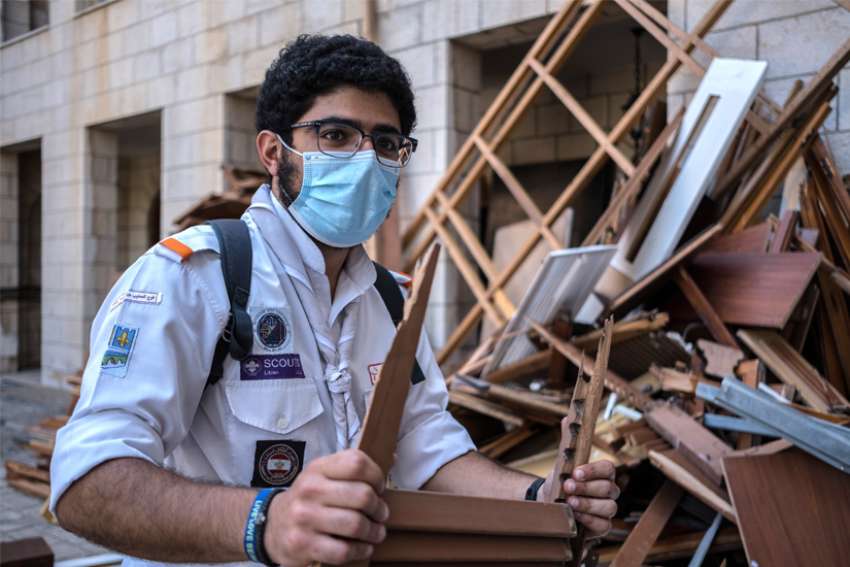That night, Archbishop Abdel Sater accompanied an injured priest and employee to the hospital. The chancery, located about a half mile from the epicenter of the blast, was badly damaged. The employee later died.
By the next morning, the archbishop had formed a crisis committee. Members set up tents alongside three stricken Maronite churches in Beirut to meet with families and determine their needs. Parish priests also visited families, blessing their homes.
The detonation of a stockpile of ammonium nitrate that had been improperly stored for years at the port is considered one of the largest nonnuclear explosions in global history. Roofs of buildings were torn off, entire sections of buildings collapsed, windows and doors shattered, and contents inside whirled like in a tornado. The force was such that even 15 miles away, windows were blown out.
More than 200 people were killed, more than 6,000 injured and more than 300,000 displaced.
The area hit by the blast was mostly inhabited by Christians. Helping people to stay in their homes is necessary, the archbishop stressed, "so the region will not be emptied of its Christian presence."
Nearly a year after the blast, Archbishop Abdel Sater told Catholic News Service his priorities in helping the impacted people: "To be beside them, consoling them, encouraging them, following them at their time of loss and sadness. And helping them as much as possible economically so they can survive. This is what we're truly trying to do as a church in Lebanon."
From the first day, Abdo Kmeid, who heads an architectural and engineering firm north of Beirut, volunteered his expertise to the archdiocese.
"When I first saw the disaster, I was shocked. When you see the magnitude of damage, you would expect even more casualties. I am convinced that God is with us, protecting us," Kmeid, a Maronite Catholic, told CNS.
Kmeid encouraged some engineers from his firm to also volunteer their time. First they prepared assessments of damaged homes. A strict procedure was devised so that all the repair work is legally documented, with limits on the cost of materials used.
More than 100 subcontractors, many of whom live in areas hit by the blast, were enlisted.
"This way, we help the people to get their houses fixed and we help the small subcontractors to work in this economic crisis," Maronite Father Jad Chlouk, who serves as treasurer to the Beirut Archdiocese, told CNS.
Within three days after the blast, the archdiocese received a donation of $1 million from the Hungarian government to repair homes, Father Chlouk said. An additional $400,000 was provided by Caritas Lebanon, from its donors.
Within the first two months, the diocesan team repaired more than 500 apartments. So far, nearly 1,500 apartments have been completed, despite coronavirus lockdowns in the winter. In all, the archdiocese assessed 2,000 apartments, and the reconstruction continues.
"What I see, really, is the hand of God helping us. Otherwise, we cannot imagine that we can do such work," Father Chlouk said.
He said the Lebanese government was "totally absent," effectively abandoning its own people.
But young people – Muslim and Christian alike -- came from all over Lebanon to offer help in the aftermath of the blast. With brooms in hand, more than 1,000 young people cleaned up apartments and rubble in the streets.
"Despite all the pain, the Lebanese are by nature volunteers. They care about humans," Nadine Abi Rached, social worker for the archdiocese, told CNS.
Father Chlouk praised local and international Catholic organizations for their help. After the blast, many secular international nongovernmental organization also came to Beirut, assessing damage to apartments and promising to help.
"Let's say, around 70% didn't accomplish what they promised, and many of those who accomplished their promises didn't do the work as they should. For this reason, we are still receiving claims from people," Father Chlouk said.
Half a block away from the Beirut Maronite chancery, the Younes family is settled back into a repaired home.
The simple ground-floor apartment is where Antoine and Fadia Younes began their life together in 1991, raising their five children.
"All our memories are here," Fadia Younes told CNS.
"We are so thankful for the help of the bishop," Antoine Younes said, with a ready smile.
The night of the blast, Fadia Younes was working at nearby St. George Hospital in her food preparation job and suffered an injured leg.
At home, her husband and children were watching television when the force of the blast blew out a tall window. The glass that covered the shelves behind where the children were seated should have, logically, blown outward; instead, it shattered inward, and the children were spared from injury.
Fadia Younes wiped her eyes as her husband explained how the image of the Virgin Mary flew off the side wall and landed at the children's feet. "She protected them, I truly believe this. It's a miracle," Fadia Younes told CNS.
Today, Lebanon is drowning in an economic crisis that the World Bank has deemed as one of the world's worst since the 1850s. The national currency has lost over 90% of its value since late 2019, plunging more than half the population under the poverty line. The country has fuel, electricity and medicine shortages.
"We can't afford what we did before," Antoine Younes said. That means the family no longer can eat meat or chicken and sometimes can't afford to buy milk.
"There is so much suffering. It gets worse every day," added Abi Rached, the social worker.


